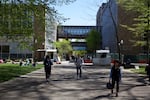
Students walk across the South Park blocks in the heart of Portland State University's downtown campus, where Ame Lambert, the school's vice president for global diversity and inclusion, agrees race should remain a consideration in college admissions.
Rob Manning / OPB
For decades, affirmative action programs have been used as one way to bring racial equity to college admissions. Now the U.S. Supreme Court has agreed to hear two cases involving affirmative action. It is widely expected to rule the practice is unconstitutional. Milyon Trulove, the vice president and dean of admission and financial aid at Reed College, told OPB’s “Think Out Loud” that very few colleges in the U.S. actually represent the diversity of the country.
”I think we’d be kidding ourselves if we didn’t acknowledge that race has a history and an impact on our lived experiences, he said. “And if we’re doing our job, then that has to be a criteria that we use in order to create these classrooms that help people survive out in our world.”
Trulove says he isn’t sure how a Supreme Court ruling will affect admissions at Reed, but he thinks some elite schools may well choose to stop taking federal money so they can continue to consider race in the many factors in the admissions process. He is concerned about what he calls the “bread basket” schools — community colleges and state universities that need federal money - that provide education to many more students in the U.S.
Ame Lambert, the vice president for global diversity and inclusion at Portland State University, agrees race should remain a consideration in college admissions.
“There is a legacy of racism in this country that is still impacting us today,” Lambert says.
She says PSU has a number of programs to help BIPOC students once they are accepted into the school. It’s about “not just getting people to, but getting people through,” she says.
Lambert says PSU’s admissions policy wouldn’t be directly affected if the U.S. Supreme Court outlawed affirmative action. But she’s concerned how that might affect other federal and state racial equity policy decisions in the future.
The Supreme Court is scheduled to take up the affirmative action cases in its next term, and a decision is expected in 2023.
To hear more from Think Out Loud’s conversation with Ame Lambert of PSU and Milyon Trulove with Reed College, click the “play” button at the top of the page.
